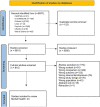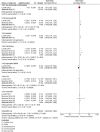Assessing the impact of contraceptive use on mental health among women of reproductive age - a systematic review
- PMID: 38816797
- PMCID: PMC11137968
- DOI: 10.1186/s12884-024-06587-9
Assessing the impact of contraceptive use on mental health among women of reproductive age - a systematic review
Abstract
Background: Contraceptive use is the principal method by which women avoid unintended pregnancy. An unintended pregnancy can induce long-term distress related to the medical, emotional, and social consequences of carrying that pregnancy to term.
Objectives: This review investigates the effects of modern contraception techniques such as birth control pills, long-acting reversible contraceptives (e.g., intrauterine devices, implants), and condoms on mental health status.
Methods: We searched multiple databases from inception until February 2022, with no geographical boundaries. RCTs underwent a quality assessment using the GRADE approach while the quality of observational studies was assessed using the Downs and Black scoring system. Data were analyzed through meta-analysis and relative risk and mean difference were calculated and forest plots were created for each outcome when two or more data points were eligible for analysis.
Main results: The total number of included studies was 43. In women without previous mental disorders, both RCTs (3 studies, SMD 0.18, 95% CI [0.02, 0.34], high quality of evidence) and cohort studies (RR 1.04 95% CI [1.03, 1.04]) detected a slight increase in the risk of depression development. In women with previous mental disorders, both RCTs (9 studies, SMD - 0.15, 95% CI [-0.30, -0.00], high quality of evidence) and cohort studies (SMD - 0.26, 95% CI [-0.37, -0.15]) detected slight protective effects of depression development. It was also noticed that HC demonstrated protective effects for anxiety in both groups (SMD - 0.20, 95% CI [-0.40, -0.01]).
Conclusions: Among women with pre-existing mental disorders who use hormonal contraceptives, we reported protective association with decreased depressive symptoms. However, the study also draws attention to some potential negative effects, including an increase in the risk of depression and antidepressant use among contraceptive users, a risk that is higher among women who use the hormonal IUD, implant, or patch/ring methods. Providers should select contraceptive methods taking individual aspects into account to maximize benefits and minimize risks.
Keywords: Anxiety; Contraception; Depression; Mental health; Systematic review.
© 2024. The Author(s).
Conflict of interest statement
The authors declare no competing interests.
Figures






Similar articles
-
Choices and services related to contraception in the Gaza strip, Palestine: perceptions of service users and providers.BMC Womens Health. 2019 Dec 19;19(1):165. doi: 10.1186/s12905-019-0869-0. BMC Womens Health. 2019. PMID: 31856794 Free PMC article.
-
Canadian Contraception Consensus (Part 1 of 4).J Obstet Gynaecol Can. 2015 Oct;37(10):936-42. doi: 10.1016/s1701-2163(16)30033-0. J Obstet Gynaecol Can. 2015. PMID: 26606712 English, French.
-
History of unintended pregnancy and patterns of contraceptive use among racial and ethnic minority women veterans.Am J Obstet Gynecol. 2020 Oct;223(4):564.e1-564.e13. doi: 10.1016/j.ajog.2020.02.042. Epub 2020 Mar 3. Am J Obstet Gynecol. 2020. PMID: 32142832 Free PMC article.
-
Folic acid supplementation and malaria susceptibility and severity among people taking antifolate antimalarial drugs in endemic areas.Cochrane Database Syst Rev. 2022 Feb 1;2(2022):CD014217. doi: 10.1002/14651858.CD014217. Cochrane Database Syst Rev. 2022. PMID: 36321557 Free PMC article.
-
Canadian Contraception Consensus (Part 2 of 4).J Obstet Gynaecol Can. 2015 Nov;37(11):1033-9. doi: 10.1016/s1701-2163(16)30054-8. J Obstet Gynaecol Can. 2015. PMID: 26629725 English, French.
Cited by
-
Associations between oral hormonal contraceptives and internalising problems in adolescent girls.BJPsych Open. 2025 Mar 4;11(2):e40. doi: 10.1192/bjo.2024.859. BJPsych Open. 2025. PMID: 40034053 Free PMC article.
-
The Impact of Estrogen-Suppressing Contraceptives on Behavioral and Functional Difficulties in Borderline Personality Disorder.medRxiv [Preprint]. 2024 Sep 4:2024.09.04.24313069. doi: 10.1101/2024.09.04.24313069. medRxiv. 2024. Update in: Neuropsychopharmacology. 2025 Apr;50(5):841-848. doi: 10.1038/s41386-024-02045-4. PMID: 39281740 Free PMC article. Updated. Preprint.
-
The impact of ovulation-suppressing contraceptives on behavioral and functional difficulties in borderline personality disorder.Neuropsychopharmacology. 2025 Apr;50(5):841-848. doi: 10.1038/s41386-024-02045-4. Epub 2025 Jan 11. Neuropsychopharmacology. 2025. PMID: 39799250 Free PMC article.
-
Unveiling the burden of premenstrual dysphoric disorder: a narrative review to call for gender perspective and intersectional approaches.Front Psychiatry. 2025 Jan 21;15:1458114. doi: 10.3389/fpsyt.2024.1458114. eCollection 2024. Front Psychiatry. 2025. PMID: 39906677 Free PMC article. Review.
References
-
- Contraceptive use by Method 2019: Data Booklet. (2019). United Nations.
Publication types
MeSH terms
Grants and funding
LinkOut - more resources
Full Text Sources
Medical

